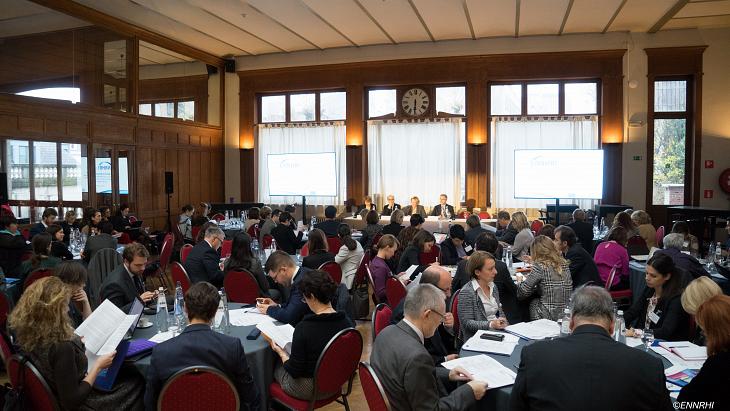At the seminar on EU – NHRI engagement organised by ENNHRI on 29 November in Brussels, about 120 representatives of NHRIs, EU Institutions, CSOs and other regional bodies discussed their cooperation and engagement for promoting and protecting human rights in Europe. In the opening of the event, panelists have stressed the crucial role of NHRIs as expert, independent institutions and valued partners on the ground.
“NHRIs are bridge-builders, dedicated to the realization of international human rights standards. At the national level, we believe ourselves to be reliable partners for the EU. NHRIs from EU member states, as well as those that are not, can provide EU with expert information on national human rights trends and challenges, and link up EU activities, policies and regulations with local realities” – said ENNHRI Chair and the Ombudswoman of Croatia Lora Vidović.
“ENNHRI is bridging and bringing together NHRIs from the region, as well as partnering up with other regional networks and international organizations. This is very precious” – remarked Jean Louis Ville (European Commission’s Directorate for Cooperation and Development – DEVCO), in the opening of the event.
For Emmanuel Crabit, representing the Directorate-General for Justice, “whatever the scenarios, the future of Europe relies on our common values and respect for fundamental rights is one of them” while “the key challenge is to render more effective fundamental rights on the ground – and improve the cooperation to protect these rights”.
For the European Commission’s Enlargement Directorate (NEAR), NHRIs have as well a crucial role: “DG NEAR recognizes and supports the crucial role of NHRIs as independent institutions. As for FRA, the EU Fundamental Rights Agency, cooperating with NHRIs is not simply a “ticking the box exercise”, FRA recognizes and values NHRIs as key partners.
Discussions at the roundtables included varied concrete ideas to further cooperation and make the work of EU institutions become more relevant at national level – from the need of public messages of support from the EU, to the NHRIs’ involvement in the elaboration of national action plans and human rights dialogues, or the complementary role of NHRIs to facilitate dissemination as well as collection of data at national level.
 Ombudswoman Submits Report 2023 Annual Report to the Croatian Parliament
Ombudswoman Submits Report 2023 Annual Report to the Croatian Parliament The Importance and Impact of Political Discourse in the Pre-Election Period
The Importance and Impact of Political Discourse in the Pre-Election Period International Conference Marks End of the Project on the EU Charter on Fundamental Rights and the Rule of Law
International Conference Marks End of the Project on the EU Charter on Fundamental Rights and the Rule of Law Parliamentary Committee on Human and National Minority Rights Votes in Favor of the Ombudswoman’s 2022 Annual Report
Parliamentary Committee on Human and National Minority Rights Votes in Favor of the Ombudswoman’s 2022 Annual Report World Homeless Day – Invisible, but also Forgotten?
World Homeless Day – Invisible, but also Forgotten? Ombudswoman to Issue Special Report on the Human Rights of Older Persons
Ombudswoman to Issue Special Report on the Human Rights of Older Persons


